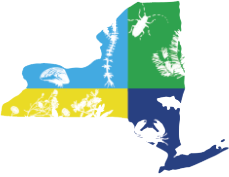Not only do native plants do a better job of hosting and supporting local insect communities than their non-native counterparts, but a University of Delaware study shows that non-native plants are compounding the problem of declining species diversity by supporting fewer herbivores across landscapes.
The research was conducted by UD alumna Karin Burghardt and Doug Tallamy, professor of entomology in the University’s College of Agriculture and Natural Resources, and published in a recent issue of Ecology Letters.
To conduct the study, the researchers planted imitation yards with different common gardens of both native and non-native tree species and collected data over a three-year period, measuring the herbivore communities and species found on those plants.
They compared native trees to non-native trees that had no close native relative and to non-natives that are closely related to the native community.
Within the distantly related group, they found that herbivores were less diverse when they looked at individual non-native tree species, and as they moved from one non-native tree species to another, they found similar species of herbivores using those trees.

Credit: University of Delaware


Leave a Reply